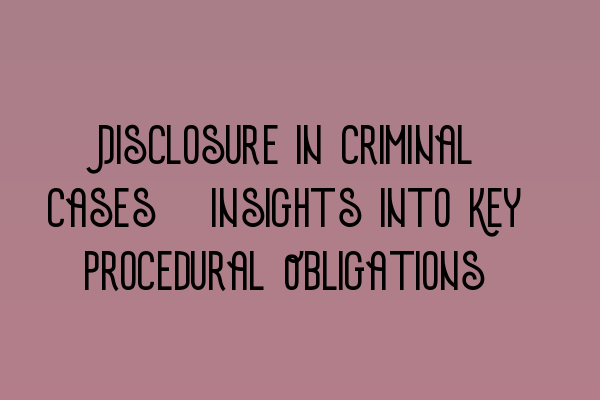Disclosure in Criminal Cases: Insights into Key Procedural Obligations
Effective disclosure is a critical aspect of criminal proceedings, ensuring fairness and transparency in the pursuit of justice. In this blog post, we will delve into the key procedural obligations surrounding disclosure in criminal cases, shedding light on its significance and implications for both the prosecution and the defense.
Understanding Disclosure
In the realm of criminal law, disclosure refers to the process by which both the prosecution and the defense exchange relevant information and evidence prior to trial. This exchange is vital for ensuring a level playing field and preventing surprises or ambush tactics during the trial. The right to disclosure is protected by Article 6 of the European Convention on Human Rights, emphasizing the importance of open and fair proceedings.
The Prosecution’s Obligations
As a prosecutor, it is crucial to diligently comply with your disclosure obligations. This means identifying and gathering all relevant evidence in your possession, custody, or control and disclosing it to the defense as soon as reasonably practicable. Failure to fulfill these obligations can result in serious consequences, such as the suppression of evidence, adjournments, or even the collapse of the entire case.
To ensure a smooth disclosure process, prosecutors should maintain organized systems for evidence management and document all steps taken to facilitate disclosure. It is also important to consult the Criminal Procedure and Investigations Act 1996, which sets out specific guidelines and standards for disclosure at different stages of the proceedings.
The Defense’s Rights
As a defense solicitor, it is essential to proactively seek disclosure from the prosecution. While the prosecution has a legal obligation to disclose, defense practitioners should actively engage, request specific documents or information, and scrutinize the evidence provided. This active approach can help uncover inconsistencies, weaknesses, or potential grounds for challenging the prosecution’s case.
Defense lawyers should also be aware of the different types of disclosure, such as primary disclosure, secondary disclosure, and ongoing disclosure. Each type carries specific obligations and timeframes, making it crucial to stay informed and ensure compliance for a robust defense strategy.
Embracing Technology in Disclosure
With the advancement of technology, disclosure has evolved beyond traditional paper-based systems. Today, digital disclosure platforms are increasingly utilized to manage vast amounts of electronic evidence efficiently. These platforms not only streamline the disclosure process but also enable advanced search capabilities, making it easier to identify relevant evidence swiftly. However, it is crucial to ensure the security and integrity of such platforms to protect sensitive information.
Conclusion
Disclosure in criminal cases is a fundamental aspect of ensuring fairness and transparency in our legal system. By recognizing and fulfilling the disclosure obligations, both the prosecution and the defense contribute to the pursuit of justice. It is crucial to remain vigilant, embrace technological advancements, and stay abreast of evolving legal standards to uphold the integrity of the disclosure process.
For more information on SQE Criminal Law & Practice, visit our website or check out these related articles:
SQE 1 Practice Exam Questions,
SQE 1 Practice Mocks FLK1 FLK2,
SQE 2 Preparation Courses,
SQE 1 Preparation Courses,
SRA SQE Exam Dates.
